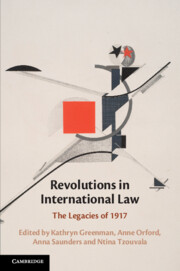Book contents
- Revolutions in International Law
- Revolutions in International Law
- Copyright page
- Contents
- Notes on Contributors
- Acknowledgements
- 1 International Law and Revolution
- Part I Imperialism
- Part II Institutions and Orders
- Part III Intervention
- Part IV Investment
- 11 1917
- 12 1917 and Its Implications for the Law of Expropriation
- 13 Contestations over Legal Authority
- 14 The Mexican Revolution
- Part V Rights
- Index
13 - Contestations over Legal Authority
The Lena Goldfields Arbitration 1930
from Part IV - Investment
Published online by Cambridge University Press: 21 January 2021
- Revolutions in International Law
- Revolutions in International Law
- Copyright page
- Contents
- Notes on Contributors
- Acknowledgements
- 1 International Law and Revolution
- Part I Imperialism
- Part II Institutions and Orders
- Part III Intervention
- Part IV Investment
- 11 1917
- 12 1917 and Its Implications for the Law of Expropriation
- 13 Contestations over Legal Authority
- 14 The Mexican Revolution
- Part V Rights
- Index
Summary
The socialist revolution in Russia introduced large-scale nationalisations and land reforms in order to empower the peasantry and the proletariat with a vision of establishing the ‘first worker’s state’.2 A key instrument in this undertaking was the nationalisation of private property, a transformation that was legal in nature. Indeed, as Scott Newton put it: ‘the elimination of private ownership of the means of production remains a breathtaking and unexampled demonstration of the puissance of law’.3
Keywords
- Type
- Chapter
- Information
- Revolutions in International LawThe Legacies of 1917, pp. 315 - 338Publisher: Cambridge University PressPrint publication year: 2021



